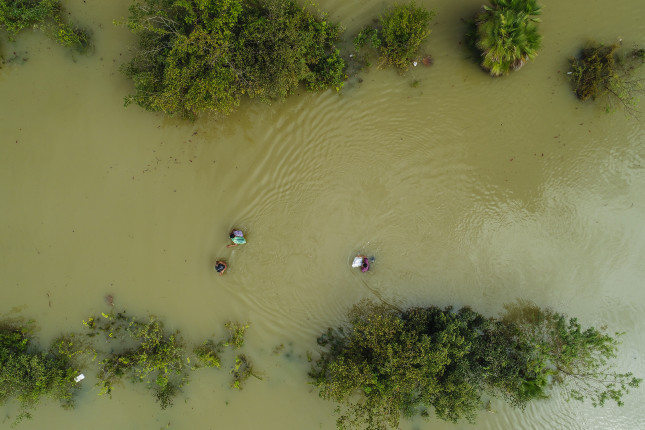-
Addressing Climate Security Risks in Central America (Report Launch)
April 24, 2023 By Wilson Center Staff
Northern Central America is experiencing a confluence of insecurity and migration challenges that are increasingly intertwined with climate change. What are the contours of this emergent convergence—and how can responses be developed and implemented more effectively?
Addressing Climate Security Risks in Central America, a new report from the Wilson Center’s Environmental Change and Security Program, written in collaboration with the National Oceanic and Atmospheric Administration (NOAA) and the University Corporation for Atmospheric Research (UCAR), offers both an assessment of the interlocking challenges and a comprehensive set of proposals to ameliorate them.
Among the report’s key findings are that the region’s convergence of security, migration and climate issues requires solutions that account for its complexity. Expanding from a singular focus on response to include a focus on prevention—including the establishment of shock-responsive social protection systems—can ease the burden on response capacities. And collaboration and inclusion with local partners is essential to unraveling an increasing knotty tangle that has damaged and endangered lives in Central America.
Addressing Climate Security Risks in Central America will also be the foundation for a panel discussion that will be held at the Wilson Center on April 28, 2023 at 10 a.m.
“Addressing the Converging Risks of Climate, Insecurity, and Migration in Central America” will offer government officials, development and security practitioners, and researchers an opportunity to discuss how to better support decision-makers, civil society, and diverse communities of practice to work together to strengthen resilience. The discussion will also encompass the analysis and policy recommendations in the Population Institute’s 2022 report, Invisible Threads: Addressing the Root Causes of Migration from Guatemala by Investing in Women and Girls.
Identifying New Pathways to Resilience
Given the challenges faced in northern Central America, the need for new pathways to resilience is clear.
Insecurity in the region has for years been fueled by violence, failing democratic governance and ineffective institutions, pervasive corruption, and drug trafficking. The expansion of illicit networks, the limited capacity of cities and urban informal settlements to absorb increased migration, and the compounding effects of the COVID-19 pandemic have accelerated this insecurity.
Intersecting with these developments is a growing climate-driven calamity. Latin America and the Caribbean (LAC) is the second-most disaster-prone region in the world, and highly susceptible not only to individual catastrophes but also an overall diminishment in resilience that hinders preparedness for future disasters.
Addressing Climate Security Risks in Central America was informed by a series of workshops that convened stakeholders from the region, current and former U.S. Government officials, civil society, researchers, and NGOs in 2021 and 2022. The climate-migration-insecurity nexus faced in El Salvador, Guatemala, and Honduras were viewed through a framework developed by ECSP, NOAA and UCAR to improve predictive capabilities for security risks posed by climate change.
While understanding the complexity of the forces at play and the power of preventative action are essential, the report also notes that “while women, youth, Indigenous peoples, and other marginalized groups regularly bear the brunt of regional challenges like climate impacts and violence … as holders of knowledge of local perceptions of risk and resilience, they can be key agents of change.” To create a truly robust regional response, “it is important to move past looking at people as potential victims and instead view them as empowered actors who can contribute to and enhance system resilience.”
A Conversation on Convergence
The April 28th event will offer analysts and practitioners a chance to reflect on the findings of Addressing Climate Security Risks in Central America and push the conversation forward.
Nahuel Arenas García—Deputy Chief of the Regional Office for the Americas & the Caribbean, United Nations Office for Disaster Risk Reduction (UNDRR)— and Martín McLaughlin—Acting Deputy Assistant Administrator in USAID’s Bureau for Latin American and the Caribbean—will offer perspectives from internationally-focused agencies working at the heart of Central America’s challenges.
Two researchers whose work is deeply intertwined in the confluence of insecurity, migration and climate—Ángel Del Valle, Country Representative and Senior Research Officer in the Population Council’s Guatemala Office, and Aracely Martínez Rodas, Director of the Master’s Program in Development at the Universidad del Valle de Guatemala—will also share their perspectives of the findings, and how they relate to their research on the potential for investments in women and girls to address the root causes of migration.
Roger Pulwarty, a Senior Scientist in the Physical Sciences Laboratory at NOAA, will put forward his insights on how we can better address challenges in the region based on the NOAA’s collaboration with ECSP and UCAR that helped create the framework for the report.
Martin McLaughlin, Acting Deputy Assistant Administrator for USAID’s Bureau for Latin America and the Caribbean, will discuss USAID’s investments in the region and the agency’s approach to integrated development to more effectively address the nexus of climate, migration, and insecurity in the region.
Kathleen Mogelgaard, President of the Population Institute, will provide introductory remarks to put into the context how the lives of women and girls are woven throughout the issues driving migration in Central America—and how recognizing these “invisible threads” in responses can help to address the root causes of migration.
Read the full report on Addressing Climate Security Risks in Central America.
Find out more about the April 28, 2023 event and sign up to attend in-person or virtually.
Sources: Population Institute and The Wilson Center.
Photo Credit: Flooded road in Central America, courtesy of Jamen Percy/Shutterstock.com.
 A Publication of the Stimson Center.
A Publication of the Stimson Center.



